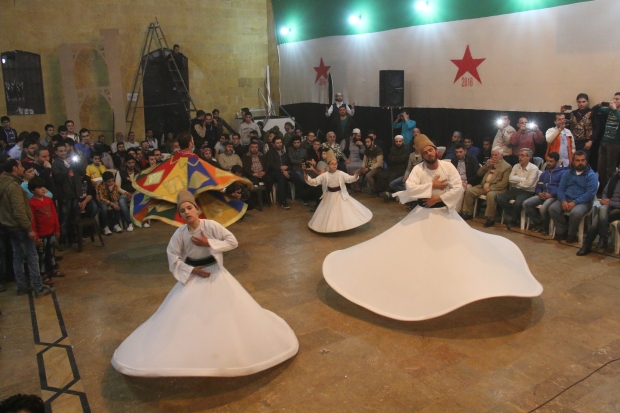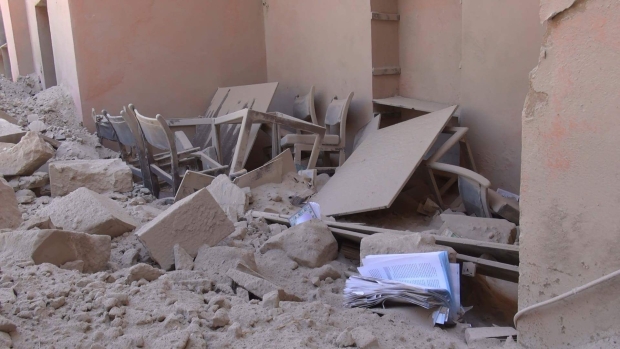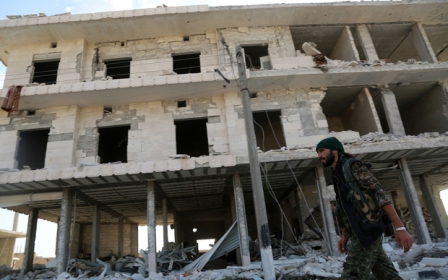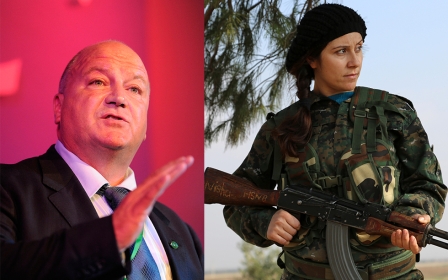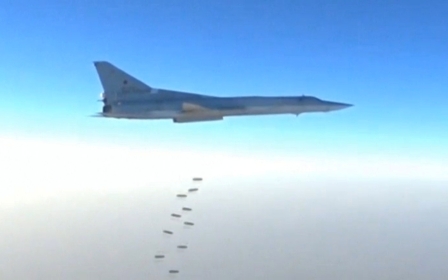Bombing books and memories: Aleppo air strikes inflict devastating cultural toll
Huthaifa Dahman has fond memories of al-Waraqa Cultural Centre, the institute at the heart of rebel-held old Aleppo that was bombed to the ground this week, leaving some residents wondering whether cultural heritage sites in the city are being deliberately targeted.
“My fiancee and I got married at al-Waraqa Cultural Centre in April – I have such wonderful memories of it,” he told Middle East Eye from Aleppo, which this week has once again been the scene of intense fighting that left the UN warning of a “humanitarian catastrophe”.
An image of a dazed five-year-old boy from Aleppo sitting alone, covered in blood and debris in the back of an ambulance, offered a shocking glimpse into life in the city on Thursday.
Translation: The children of Aleppo
The wounded boy, named Omran Daqneesh, is now in a stable condition - along with four other children, a woman and two young men - by an alleged government air strike on the rebel-held neighbourhood of Qaterji late on Wednesday.
In addition to the human costs of war, residents say the destruction of sites like al-Waraqa is leaving a hole in the heart of the historic city.
“It was in an old area of the city with ancient buildings all around, and a big yard like all the old-style buildings in Syria,” Dahman told Middle East Eye.
“On Monday, the government destroyed all that in the blink of an eye. It’s terrible to see your memories devastated, especially when it relates to your own marriage.”
Al-Waraqa was set up less than nine months ago as a centre for education, culture and entertainment in the rebel-held Bab al-Maqam district of Aleppo’s historic city centre.
It was headquartered in an old fabric warehouse that was abandoned in 2011 when war came to Aleppo, once Syria’s biggest industrial hub and most diverse city.
As well as a courtyard used for weddings and public occasions, the building housed a library of books printed in Beirut, sent to Turkey and then smuggled across the border to Aleppo, which was once the most populous city in Syria.
The centre’s manager, 48-year-old Abdel Rahman Ismail, said the centre narrowly avoided becoming the site of a “massacre,” with the bombing coming just two hours before a public meeting.
“The missile that hit on Monday afternoon destroyed the whole centre,” Ismail told MEE.
“Fortunately nobody was in the building, but two guards outside were wounded.
“The devastation was massive, many of the books were burned to a cinder.”
Gomaa Mohammed, whose educational NGO Kesh Malek used the hub as a location for photography exhibitions, said he had no idea why the building was targeted.
“It’s a real grief to see Aleppo’s historical heritage totally devastated without even an excuse; they can’t say this was an assembly point for armed groups or terrorists.
“This was just an active place, with a daily programme of activities. We held photography exhibitions here, dealing with forced disappearance in Syria and how other countries have dealt with their experience of disappeared civilians.”
For Salem Abu al-Nasser, a respected member of the Aleppo community and a frequent borrower from al-Waraqa’s collection of books on politics, history and literature, the centre’s destruction did not come as a surprise but pointed to a campaign targeting Aleppo’s cultural heritage.
“For me, it’s not strange that the government targets historical sites in the city,” he said, pointing to the collapse of part of the ancient Aleppo Citadel that was blamed on government shelling.
“I can see that the targets aren’t random at all. [Assad’s forces] know that al-Waraqa, like the rest of Aleppo’s historical sites, isn’t a base for military actions or so-called terrorists. He aims to destroy Syria’s heritage.”
Ismail, head of al-Waraqa, told MEE that the shelling of the city was still too intensive to start rebuilding the centre. “We will wait some time,” he said. “We will move what is left to a different location, and finish what we started.”
This article is available in French on Middle East Eye French edition.
Stay informed with MEE's newsletters
Sign up to get the latest alerts, insights and analysis, starting with Turkey Unpacked
Middle East Eye delivers independent and unrivalled coverage and analysis of the Middle East, North Africa and beyond. To learn more about republishing this content and the associated fees, please fill out this form. More about MEE can be found here.


